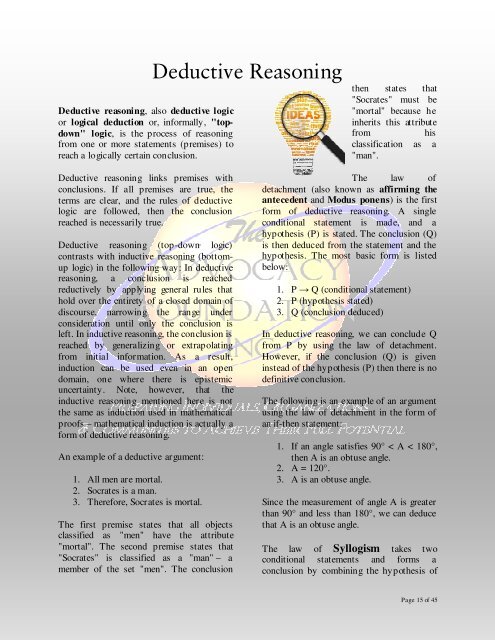Critical Thinking for Transformative Justice
Critical Thinking for Transformative Justice
Critical Thinking for Transformative Justice
You also want an ePaper? Increase the reach of your titles
YUMPU automatically turns print PDFs into web optimized ePapers that Google loves.
Deductive reasoning, also deductive logic<br />
or logical deduction or, in<strong>for</strong>mally, "topdown"<br />
logic, is the process of reasoning<br />
from one or more statements (premises) to<br />
reach a logically certain conclusion.<br />
Deductive Reasoning<br />
then states that<br />
"Socrates" must be<br />
"mortal" because he<br />
inherits this attribute<br />
from<br />
his<br />
classification as a<br />
"man".<br />
Deductive reasoning links premises with<br />
conclusions. If all premises are true, the<br />
terms are clear, and the rules of deductive<br />
logic are followed, then the conclusion<br />
reached is necessarily true.<br />
Deductive reasoning (top-down logic)<br />
contrasts with inductive reasoning (bottomup<br />
logic) in the following way: In deductive<br />
reasoning, a conclusion is reached<br />
reductively by applying general rules that<br />
hold over the entirety of a closed domain of<br />
discourse, narrowing the range under<br />
consideration until only the conclusion is<br />
left. In inductive reasoning, the conclusion is<br />
reached by generalizing or extrapolating<br />
from initial in<strong>for</strong>mation. As a result,<br />
induction can be used even in an open<br />
domain, one where there is epistemic<br />
uncertainty. Note, however, that the<br />
inductive reasoning mentioned here is not<br />
the same as induction used in mathematical<br />
proofs – mathematical induction is actually a<br />
<strong>for</strong>m of deductive reasoning.<br />
An example of a deductive argument:<br />
1. All men are mortal.<br />
2. Socrates is a man.<br />
3. There<strong>for</strong>e, Socrates is mortal.<br />
The first premise states that all objects<br />
classified as "men" have the attribute<br />
"mortal". The second premise states that<br />
"Socrates" is classified as a "man" – a<br />
member of the set "men". The conclusion<br />
The law of<br />
detachment (also known as affirming the<br />
antecedent and Modus ponens) is the first<br />
<strong>for</strong>m of deductive reasoning. A single<br />
conditional statement is made, and a<br />
hypothesis (P) is stated. The conclusion (Q)<br />
is then deduced from the statement and the<br />
hypothesis. The most basic <strong>for</strong>m is listed<br />
below:<br />
1. P → Q (conditional statement)<br />
2. P (hypothesis stated)<br />
3. Q (conclusion deduced)<br />
In deductive reasoning, we can conclude Q<br />
from P by using the law of detachment.<br />
However, if the conclusion (Q) is given<br />
instead of the hypothesis (P) then there is no<br />
definitive conclusion.<br />
The following is an example of an argument<br />
using the law of detachment in the <strong>for</strong>m of<br />
an if-then statement:<br />
1. If an angle satisfies 90° < A < 180°,<br />
then A is an obtuse angle.<br />
2. A = 120°.<br />
3. A is an obtuse angle.<br />
Since the measurement of angle A is greater<br />
than 90° and less than 180°, we can deduce<br />
that A is an obtuse angle.<br />
The law of Syllogism takes two<br />
conditional statements and <strong>for</strong>ms a<br />
conclusion by combining the hypothesis of<br />
Page 15 of 45

















